Plural Maghreb
- 208pages
- 8 heures de lecture
Abdelkebir Khatibi (1938-2009) was among the most renowned North African literary critics and authors of the past century whose unique treatments of subjects as vast as orientalism, otherness, coloniality, aesthetics, linguistics, sexuality, and the nature of contemporary critique have inspired major figures in postcolonial theory, deconstruction, and beyond. At once a philosophical visionary and provocative writer, Khatibi's impressive contributions have been well-established throughout French and continental literary circles for several decades. As such, this English translation of one of his masterworks, Maghreb Pluriel (1983), marks a pivotal turn in the opportunity to wrest some of Khatibi's most profound meditations to the forefront of a more global audience. Including such highly significant pieces as "Other-Thought," "Double Critique," "Bilingualism and Literature," and "Disoriented Orientalism," the ambition behind this volume is to showcase the true experimental complexity and conceptual depth of Khatibi's thinking. Engaging the cultural-intellectual urgencies of a colonial frontier (in this case, the so-called Middle East/North Africa) this book expands our contemplative boundaries to render a globally-dynamic commentary that traverses the East-West divide.

